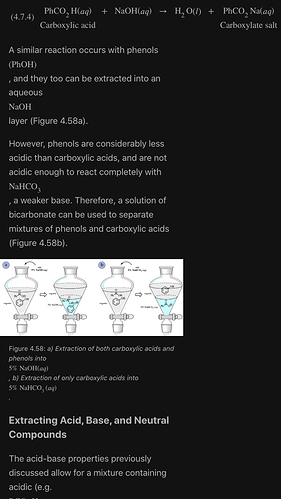What would need to be done differently to achieve good yields with hemp?
Looks cool
Not sure if it would be beneficial over other extraction styles… I also don’t know if pH 9.5 would be high enough to bond with the acidic cannabanoids
![]() it’s all your fault. You sneaky spoonreader.
it’s all your fault. You sneaky spoonreader.
I have heard whispering of this being done, i figured starting a topic was the best way to get a public discussion going
This method adjusts the pH to 8.4 and reduces the volume to 20-50%. The BP of ethanol is ~173, and water is 212. Would this cause any isomerization to D10 or CBN?
Is hexane with a low BP a better alternative to keep CBDA without decarbing?
(Sorry if I’m asking questions that make you think I drink pumpkin spice lattes)
I have no experience with the mixture of both water and alcohol extraction. Understanding extraction you would have to find a way to separate water/alcohol/oil. This would seem very time consuming. I have personally extracted both THC and CBD using water with much success.
the target compound (cbda) should precipitate out if you decrease the solubility of the ethanol by increasing the amount of water correct? Or am i missing something
Louche alert! Yes that is correct
Your not removing alcohol by adding volume your just making alcohol anhydrous you will still have to separate the two eventually. Water and alcohol have much different boiling points as well. You can ultimately pull the cannabinoids out using water and drop out of solution with the right sop. Your complicating the process
the word had escaped me, ty!
Sometimes a search term is all you need!
Anytime you add water you add significant energy in evaporation energy required.
The alcohol water mix (in theory) should have a tune-able polarity and solvency towards desired compounds; insofar as that you could make a very high quality crude. But your solvent capacity would likely be dropped quite significantly (probably by a factor of 4-10x) so evaporation would be considerably more energy consuming. But… You could mostly skip winterizing.
It’s all a matter of scale and efficiency at scale. There’s no magic bullet, just increasingly complicated systems with degrees of cost savings and increases.
My biggest advice… Build your setup around your desired end product.
but if is about polarity, or achieving the right polarity to attract what your looking for then in theory you should be able to drop oil out of solution with reverse polarity (for lack of better term). Once you achieve the right polarity separation is all that is needed. Their is no need for heat at that point.
If you “louche” (add a bunch of water to) your solution the oil will indeed fall out of solution, so no need for heat.
But then you need to take your initial alcohol/solvent solution back to the original concentration (i.e. removing water) which does (generally) require energy.
You could certainly drop the pH as well. I’ve used hydrochloric acid to push cannabanoids out of solution, it works well in liquid-liquid systems. There’s lots of fun things you can do with pH.
Would soaking hemp in coconut oil extract cbda? (Sorry if that is a dumb question)
Could the ph method be used to make that work better?
You can use oils to extract the cbda yes, it’s soluble. But then you’re left with a non-activated cannabanoid solution.
The pH would unlikely help this situation, as the MCT/cocpnut oil are highly non-polar; there’s very few pH altering compounds that dissolve and interact in an oil based solution. So basically your pH 9-10 stuff (sodium carbonate or the like) will just sit there, maybe bind to your acidic cannabanoids, but not bind to the carrier oil.
yup. use diethyl ether or something similar that is not miscible in water.
I just now happened to get the lab test back on the coconut oil topical i make, and it does have more cbda in it than cbd. It gets boiled in water with the basic cannabutter recipe, so it seems the 212 temp does a partial decarb.
I really only sent it off to test, because I read on here that cbd topicals don’t work. I know mine does, but it seems that the cbda is what is doing the job.
It’s not that they don’t work at all, it’s just the BA of a topical route is low. Like you said, cbda might be more topically active, and other oils/carriers can help permeate the skin barrier.
